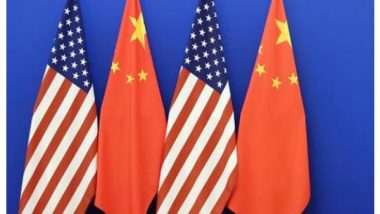Beijing, June 30: Based on China's massive and highly successful espionage operations, it is often wrongly portrayed as the world's leading cyber power, says a new study which claims that United States continues to be ahead with its much stronger track record. Nikkei Asia reported the new assessment brought out by the International Institute for Strategic Studies.
Singapore-based Greg Austin, a senior fellow at the Institute opines in the daily that critical weaknesses put Beijing well behind the US. He says the analyses will not be so shocking to long-term students of national innovation systems, nor those who have experienced university life overseen by a self-confessed dictatorship. China is Stealing Intellectual Property on an Industrial Scale to Stay Competitive, Says Report.
Cyber power depends on three factors: how well organized each country is -- strategy and doctrine, and command and control; how well it can defend itself through its own cybersecurity or through international partnerships; as well as how effectively its digital economy can support its cyber needs and ambitions.
The publication reported that China's strategy is lagging, its cyber defenses are weak and morever, the US with the strength of its digital economy, maintains its most powerful edge over China.
Though Chinese universities and the country's researchers are world leaders in some important advanced technologies like quantum communications, survey data from China's University Alumni Association indicates that the country has no world-class universities in the field of cybersecurity, which is an essential foundation of cyber capability.
"The Chinese innovation system is struggling to adapt to the demands of security in cyberspace and universities may be its weakest link," says the Nikkei report.
Several factors are combining to retard China's universities: higher education institutions globally are highly conservative; professors who control curricula, spending and organizational arrangements do not like new or expanded departments of cybersecurity; there are not enough university educators and dissertation supervisors to meet rising demand. Add to that the fact that the Chinese Communist Party is too intent on linking promotion to ideological activism, monitoring every email sent by professors and students.
Outside its universities, China has no answer for the highly successful US formula of close collaboration -- for private profit -- among universities, industry and government.
Nikkei Asia further reported that even if China could rise to the top rank of cyber power in a one-to-one comparison with the US, it still does not have the means to match American power arising from its position as the hub of the most powerful cyber intelligence alliance in history, the Five Eyes network.
The US can also count on many other cyber-capable allies, such as France and Israel. It can also count on Japan, though in very different ways.
(The above story is verified and authored by ANI staff, ANI is South Asia's leading multimedia news agency with over 100 bureaus in India, South Asia and across the globe. ANI brings the latest news on Politics and Current Affairs in India & around the World, Sports, Health, Fitness, Entertainment, & News. The views appearing in the above post do not reflect the opinions of LatestLY)












 Quickly
Quickly


